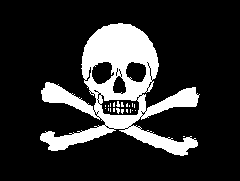
The Great Pirates
by Flemming Funch, 7 December 1994.In his book "Operating Manual for Spaceship Earth", in the chapter "Origins of Specialization", Buckminster Fuller tells the story about what he calls "The Great Pirates". This is my greatly shortened version of it:
Some hundreds of years ago the technology of ship building advanced so that it became practical to travel the oceans for extended periods of time. Thus whole new territories were opened to exploration and possible domination.
It became clear that it was impractical to assume that the law and order of the land could be applied to the sea. Thus the oceans became a zone of lawlessness and a battleground for whomever chose to enter the arena. It also became clear that those who fared best were those who mastered all the elements of survival at sea and who did their business under the veil of secrecy. It is those who mastered this game that we can call The Great Pirates.
A Great Pirate succeeded because of his comprehensive command of a whole set of different disciplines. He had a high proficiency in dealing with celestial navigation, the sea, the storms, the ship, the men, economics, biology, geography, history, and science. The better the Great Pirate could understand and anticipate the whole scene, the better he would do.
Great Pirates would travel, bargain, plunder, plan, negotiate, battle, and much more. He would use the science of ship building to amass a fleet, he would use his people skills to manage his crew and to negotiate with representatives of far away lands. He would do his activities out of sight of people on land and of his competitors.
A Great Pirate would naturally want to maintain his position, and he had to sleep once in a while. He therefore at first surrounded himself with dull-witted but loyal men of muscle. Only he himself planned and coordinated his operations, and his men simply did what they were told. However, when the Great Pirate expanded his operations it became clear that he needed something more than that.
The Great Pirate invented the brilliant scheme of specialization. It is both the way to expand his empire with skilled assistance and at the same time the insurance that only HE will ever know the full picture of what is going on.
The Great Pirates started to encourage and employ people of great skill in specialized areas. There might be, for example, a greatly skilled and experienced Navigator. And there might be a master Weapon Builder, an accomplished Master Historian, a Politician, a Ship's Captain, a General, and so forth.
Each of those people were cultivated to a high level of skill. But also, it was made clear to each one that they had better stay within their specific field, or they would lose their head.
The Great Pirate himself would be the ONLY person who knew the whole picture. He would know the plan, he would know where ships would go and why, he would know what they would find, who they would meet, he would know what to trade and what to steal, he would know who to trust and who not to. None of his people would ever be allowed near the full picture, and none of them could therefore possibly replace him. And thus his position was safe from any coup by those close to him. He always kept the true full picture in utmost secrecy and kept the skills and knowledge of all his people perpetually compartmentalized.
Through the ingenious scheme of specialization and compartmentalization of knowledge, the Great Pirates were able to expand their business immensely. They were able to expand their influence into different lands through carefully chosen and educated front people. They would chose local strong men in different territories, supply them with what they needed to assume power, educate them to present a proper public facade, but never giving them the knowledge of all the pieces in the game. The local strong man might be maneuvered into a position of King, assumed by his people to be the utmost authority, but in essence simply being another of the specialized agents of the hidden Great Pirates. The Great Pirate would naturally also cultivate agents in the fields of religion, education, science, military, banking, and so forth, and would naturally be able to play them out against each other if any one of them ever got ambitious beyond his assigned role.
The Great Pirate knew the world was round when everybody else were kept in the belief that it was flat. He knew about grand logistical schemes, he knew about international exchange media and trade balancing, and much more. He was the only one who saw the whole picture of the planet and its resources, and was therefore able to play his game totally unnoticed by the vast majority of the population of the planet. All through the magic of specialization ...
It goes without saying that specialization today has become so much part of our society that most people take it for granted. It is perfectly acceptable to base one's whole life and career on a small subsection of a certain very specific subject. It is perfectly acceptable that people are so specialized that most other people have no idea what they are talking about.
I find it a VERY enlightening view that this can be regarded as a scheme for keeping people in ignorance so that they can't do anything about the whole situation, and they can't talk with each other. Everybody's busy with their little chunk of the world, so busy that they don't notice what is really going on.
Time has come to move beyond this, and this time make the knowledge of whole systems and the interactions between different fields available to greater numbers of people.
- Flemming
-The lesson? EVERYONE should become a Great Pirate at whatever they do. (PirateMonk)









